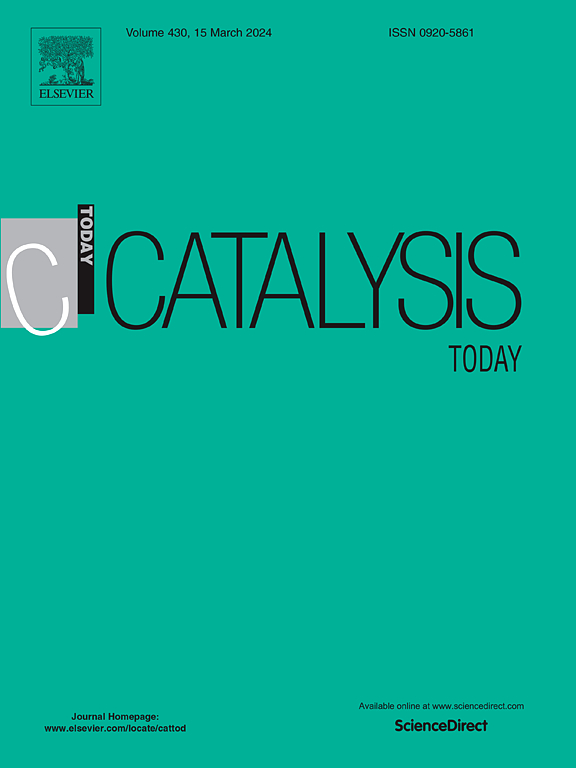Unveiling the stability of mixed Zn/Co-ZIFs as catalysts for CO2 fixation into cyclic carbonates
IF 5.2
2区 化学
Q1 CHEMISTRY, APPLIED
引用次数: 0
Abstract
Zeolitic imidazolate frameworks (ZIFs) are a subclass of metal-organic frameworks (MOFs) which exhibit a zeolitic structure. These materials have been extensively used as catalysts in CO2 cycloaddition with epoxides to form cyclic carbonates. However, their stability under reaction conditions is rarely investigated. In this work, four ZIFs were synthesized: monometallic ZIF-67 (with Co), ZIF-8 (with Zn), bimetallic Zn/Co-ZIF-67 (with three-dimensional structure), and Zn/Co-ZIF-L (with two-dimensional structure). Even though the solids presented different crystalline structures, textural properties, and CO2 adsorption capacities, the bimetallic samples showed similar catalytic behavior with high yield (60–65 %) and selectivity (92–94 %) to propylene carbonate (PC). In comparison, the monometallic samples exhibited a somewhat higher yield (∼ 79 %) and selectivity (∼ 97 %) to PC. However, the characterization of the used catalysts showed a substantial loss in crystallinity and porosity for the monometallic ZIF-67 and ZIF-8. At the same time, the Zn/Co-ZIF-67 exhibited the highest stability in maintaining its original structure and porosity. Conversely, the Zn/Co-ZIF-L recrystallized into the sodalite three-dimensional structure after being used in two catalytic reactions. All used catalysts showed the same Zn local environment after the reaction, while the final Co species formed depended on the catalyst’s initial structure and chemical composition.
揭示作为环碳酸盐二氧化碳固定催化剂的混合 Zn/Co-ZIF 的稳定性
沸石咪唑啉框架(ZIFs)是金属有机框架(MOFs)的一个子类,具有沸石结构。这些材料已被广泛用作二氧化碳与环氧化物环化生成环状碳酸盐的催化剂。然而,很少有人研究它们在反应条件下的稳定性。本研究合成了四种 ZIF:单金属 ZIF-67(含 Co)、ZIF-8(含 Zn)、双金属 Zn/Co-ZIF-67(三维结构)和 Zn/Co-ZIF-L(二维结构)。尽管这些固体具有不同的晶体结构、纹理特性和二氧化碳吸附能力,但双金属样品表现出相似的催化行为,对碳酸丙烯酯(PC)具有较高的产率(60-65%)和选择性(92-94%)。相比之下,单金属样品对 PC 的产率(79%)和选择性(97%)略高。然而,对所使用催化剂的表征显示,单金属 ZIF-67 和 ZIF-8 的结晶度和孔隙率大幅下降。同时,Zn/Co-ZIF-67 在保持其原始结构和孔隙率方面表现出最高的稳定性。相反,Zn/Co-ZIF-L 在用于两个催化反应后重新结晶为钠长石三维结构。所有使用过的催化剂在反应后都显示出相同的 Zn 局部环境,而最终形成的 Co 种类则取决于催化剂的初始结构和化学成分。
本文章由计算机程序翻译,如有差异,请以英文原文为准。
求助全文
约1分钟内获得全文
求助全文
来源期刊

Catalysis Today
化学-工程:化工
CiteScore
11.50
自引率
3.80%
发文量
573
审稿时长
2.9 months
期刊介绍:
Catalysis Today focuses on the rapid publication of original invited papers devoted to currently important topics in catalysis and related subjects. The journal only publishes special issues (Proposing a Catalysis Today Special Issue), each of which is supervised by Guest Editors who recruit individual papers and oversee the peer review process. Catalysis Today offers researchers in the field of catalysis in-depth overviews of topical issues.
Both fundamental and applied aspects of catalysis are covered. Subjects such as catalysis of immobilized organometallic and biocatalytic systems are welcome. Subjects related to catalysis such as experimental techniques, adsorption, process technology, synthesis, in situ characterization, computational, theoretical modeling, imaging and others are included if there is a clear relationship to catalysis.
 求助内容:
求助内容: 应助结果提醒方式:
应助结果提醒方式:


